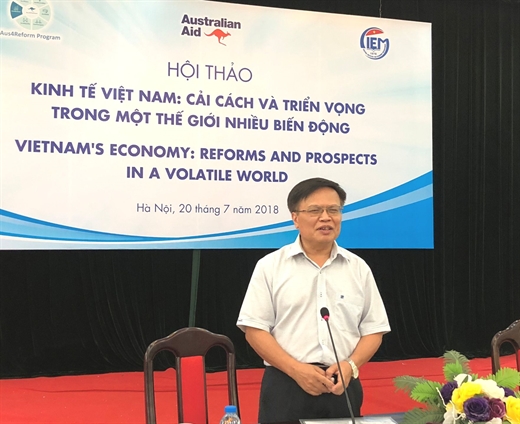Australia supports Economic Reform in Vietnam (Aus4Reform)
- en
- News and Media
- Aus4Reform News
- Vietnam's GDP grows by 7.08% in the first 6 months, the highest since 2011
17/8/2018
Vietnam's GDP grows by 7.08% in the first 6 months, the highest since 2011
“Vietnam's economy is still in a period of expansion in the cycle of growth. The real GDP is still higher than the trend, the growth has not shown signs of overheating”.-
Vietnam's GDP grows by 7.08% in the first 6 months, the highest since 2011
“Vietnam's economy is still in a period of expansion in the cycle of growth. The real GDP is still higher than the trend, the growth has not shown signs of overheating”.-
This is information presented at the seminar “Vietnam's economy: Reform and prospects in a volatile world” under the "Australian Support for Economic Reform" program (Aus4Reform Program) funded by the Australian Department of Foreign Affairs and Trade (DFAT) and held by the Central Institute for Economic Management (CIEM) on the morning of July 20.
 |
| Dr. Nguyen Dinh Cung (The Director of Aus4Reform Programe) |
The workshop reiterated the message that policy priority should continue to focus on improving the microeconomic platform and reforming the economic institution system in a way that is more friendly to innovation and the environment, along with effectively handling risks in the fluctuating international economic environment. Accordingly, the workshop also discussed some recommendations on reforming the microeconomic foundation, in conjunction with macroeconomic measures and some related measures such as monetary policy, fiscal policy, price policy, wages, FDI policies.
GDP increases but no signs of “overheating”
According to Nguyen Anh Duong, Head of CIEM’s Macroeconomic Policy Department, Vietnam's economy entered the second quarter with much enthusiasm and expectation. Changes in the business environment improvement, economic restructuring along with the priority of macroeconomic stability in the previous quarters more or less strengthened the confidence of the market.
However, the socio-economic results in Q4 / 2017 and Q1 / 2018 also received some doubts, especially in the quality of growth and inflationary pressures. Economic recession risk was also mentioned, mainly due to concerns about the evolution of the growth cycle and the unpredictable evolution of US-China trade tension.
GDP in the first 6 months of the year has achieved positive results, is 7.08%. This result will reduce the operating pressure in the last half of 2018 to get the full-year target of 6.71%. Vietnam's economy is still in a period of expansion in the cycle of growth. The real GDP is still higher than the trend. GDP growth has not shown signs of overheating.
Average CPI (Consumer Price Index) in the first 6 months increased by 3.29% over the same period last year. Core inflation remained stable at a low level, rising by 1.35% in the first six months of the year, the lowest level in recent years. Inflationary pressures in the last few months are still very noticeable. The demand for dealing with inflationary pressures is relatively similar to 2008 (though different levels) due to the risk of economic recession under the influence of external factors.
The focus should be on improving microeconomics
Analysis of the opportunities and risks for the shared economy model in Vietnam, Mr. Duong said: Currently, Vietnam is emerging three types of key services including online transportation services, room sharing services, and peer lending. The benefits of shared economy model include: Saving resources by using economically assets throughout the life cycle; Reducing transaction costs in economic activities; contributing to promoting technology development in general and information technology in particular.
_171714732.jpg) |
| Mr. Nguyen Anh Duong, Head of CIEM’s Macroeconomic Policy Department |
However, the development of shared economy model also raises risks such as the emergence of new relationships in the market, conflicts of interest between buyers and sellers, unfair competition, and full implementation of financial obligations. The report identifies the policies related to the registration of operations, payment mechanisms, regulations on information, e-commerce, tax policy and inspection.
Mr. Duong suggested we establish the State Capital Management Committee at the enterprise. In addition, it is necessary to build "large database", IT infrastructure system and apply digital economy to operate the owner's representative function; clarify the supervisory mechanism for the State Capital Management Committee at the enterprise; consolidate ownership associated with enhancing accountability; apply good monitoring methods and tools for state- owned enterprise governance.
The first half of 2018 has passed with many bright points in socio-economic development. The economic growth has been maintained, coupled with changes in the business environment, confidence of domestic and foreign-funded enterprises has been strengthened. Economic growth in the first 6 months is not based on monetary expansion. Balance of trade continues to surplus. Economic growth has not led to cyclical inflationary pressures, due to the limited impact of monetary and fiscal expansion.
"Compared with the previous crisis, Vietnam now has more experience and is calmer to cope with adverse effects from the world economic developments. However, many concerns still exist, including the change level in growth quality is not really clear; inflationary pressures stay; the ability to sustain the momentum of micro-economic reform in general and reform of the business environment in particular is a big question", he said.
Consequently, it is necessary to continue to focus on improving the microeconomic fundamentals and innovating the economic institution system to be more friendly to creation and environment, coupled with the efficient handling of risks in the fluctuating international economic environment.

